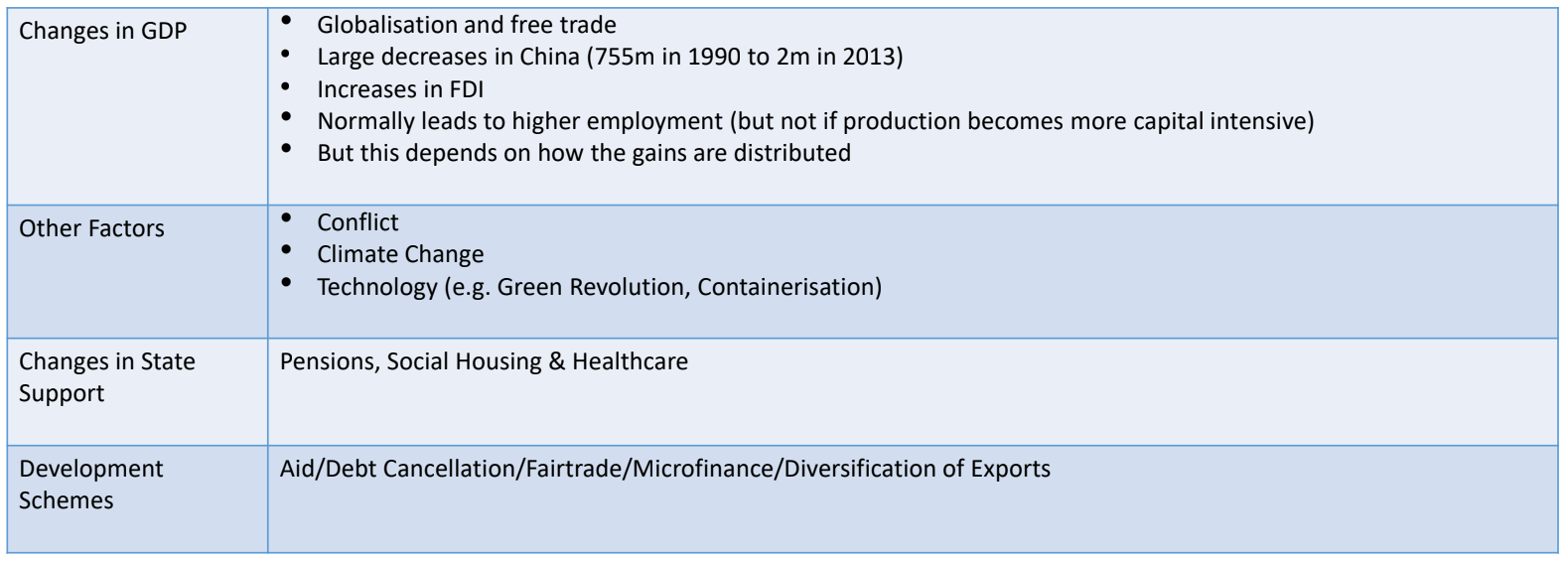3a. Poverty
Absolute poverty
Those who do not have enough resources to survive e.g. food, water and shelter
Those earning under $1.90 a day (PPP)
Causes of changes in absolute poverty

Relative poverty
If you do not have the resources to participate in everyday life then you are relatively poor
Measured as 60% of the median income (not the mean because high earners will drag the average up and these are not representative of everyday life)
Causes of changes in relative poverty

Causes of poverty
A disproportionate number of people without jobs are in poverty
Lack of human capital i.e. education and training
Lack of financial capital – especially amongst retirees
Health problems effecting an individuals ability to work
Being dependent on others for income
Those born into poor families have a disproportionate chance of being poor themselves
Differences in countries and regions
The poverty trap
Where you are financially better off by not working. For example, by taking a job you lose your Universal Credit, housing benefit, free school meals for your children but also pay more in tax and have to pay for childcare
It creates a disincentive either to look for work or work longer hours because of the effects of the income tax and welfare benefits system.
The individual may lose some income-related welfare benefits and the combined effects of this might be to take away over 70% of a rise in income, leaving little in the way of extra net or disposable income.
When adding in the possible extra costs of more expensive transport charges and the costs of arranging childcare, then the disincentive to work may be quite strong
Does Economic Growth Reduce Relative Poverty and Income Inequality?
Economic Growth will reduce relative poverty and income inequality if:
Wages of the lowest paid rise faster than the average wage
Government benefits, such as; unemployment benefits, sickness benefits and pensions are increased in line with average wages.
Economic Growth creates job opportunities which reduce the level of unemployment. Unemployment and lack of employment is one of the biggest causes of relative poverty.
Minimum Wages increased in line with average earnings
Why Economic Growth May not Reduce Income Inequality and Poverty
Economic Growth often creates the best opportunities for those who are highly skilled and educated. In recent years, in the UK, we have seen faster wage growth for highly paid jobs than unskilled jobs.
Modern economies are creating an increased number of part time / flexible service sector jobs. In these sectors wages have been lagging behind average earnings.
In the UK, government benefits have been indexed linked. This means increased in line with inflation. This means that benefit incomes have fallen behind average earnings.
Policies to reduce inequality and poverty
Sustained economic growth
Reduce unemployment
Progressive taxes
Increasing benefits
Increase national minimum wage
In a developing country policies might include:
Education
Foreign aid
Diversifying the economy away from agriculture and towards manufacturing